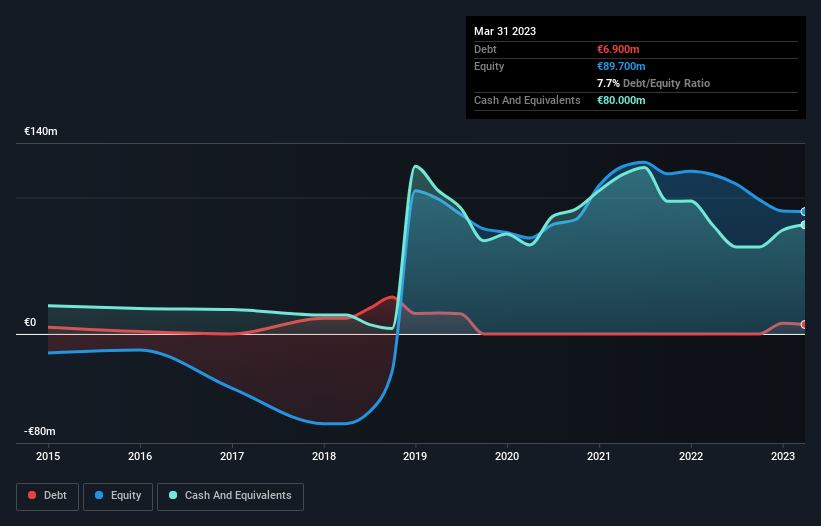- Germany
- /
- Specialty Stores
- /
- XTRA:WEW
Health Check: How Prudently Does Westwing Group (ETR:WEW) Use Debt?
Some say volatility, rather than debt, is the best way to think about risk as an investor, but Warren Buffett famously said that 'Volatility is far from synonymous with risk.' So it seems the smart money knows that debt - which is usually involved in bankruptcies - is a very important factor, when you assess how risky a company is. As with many other companies Westwing Group SE (ETR:WEW) makes use of debt. But should shareholders be worried about its use of debt?
When Is Debt Dangerous?
Debt and other liabilities become risky for a business when it cannot easily fulfill those obligations, either with free cash flow or by raising capital at an attractive price. Ultimately, if the company can't fulfill its legal obligations to repay debt, shareholders could walk away with nothing. While that is not too common, we often do see indebted companies permanently diluting shareholders because lenders force them to raise capital at a distressed price. Of course, plenty of companies use debt to fund growth, without any negative consequences. The first step when considering a company's debt levels is to consider its cash and debt together.
See our latest analysis for Westwing Group
What Is Westwing Group's Net Debt?
The image below, which you can click on for greater detail, shows that at March 2023 Westwing Group had debt of €6.90m, up from none in one year. However, its balance sheet shows it holds €80.0m in cash, so it actually has €73.1m net cash.

How Strong Is Westwing Group's Balance Sheet?
We can see from the most recent balance sheet that Westwing Group had liabilities of €96.6m falling due within a year, and liabilities of €43.3m due beyond that. Offsetting these obligations, it had cash of €80.0m as well as receivables valued at €12.4m due within 12 months. So its liabilities outweigh the sum of its cash and (near-term) receivables by €47.5m.
Westwing Group has a market capitalization of €164.0m, so it could very likely raise cash to ameliorate its balance sheet, if the need arose. But it's clear that we should definitely closely examine whether it can manage its debt without dilution. Despite its noteworthy liabilities, Westwing Group boasts net cash, so it's fair to say it does not have a heavy debt load! There's no doubt that we learn most about debt from the balance sheet. But ultimately the future profitability of the business will decide if Westwing Group can strengthen its balance sheet over time. So if you're focused on the future you can check out this free report showing analyst profit forecasts.
Over 12 months, Westwing Group made a loss at the EBIT level, and saw its revenue drop to €423m, which is a fall of 15%. That's not what we would hope to see.
So How Risky Is Westwing Group?
While Westwing Group lost money on an earnings before interest and tax (EBIT) level, it actually generated positive free cash flow €6.5m. So although it is loss-making, it doesn't seem to have too much near-term balance sheet risk, keeping in mind the net cash. With revenue growth uninspiring, we'd really need to see some positive EBIT before mustering much enthusiasm for this business. There's no doubt that we learn most about debt from the balance sheet. But ultimately, every company can contain risks that exist outside of the balance sheet. These risks can be hard to spot. Every company has them, and we've spotted 2 warning signs for Westwing Group you should know about.
When all is said and done, sometimes its easier to focus on companies that don't even need debt. Readers can access a list of growth stocks with zero net debt 100% free, right now.
Valuation is complex, but we're here to simplify it.
Discover if Westwing Group might be undervalued or overvalued with our detailed analysis, featuring fair value estimates, potential risks, dividends, insider trades, and its financial condition.
Access Free AnalysisHave feedback on this article? Concerned about the content? Get in touch with us directly. Alternatively, email editorial-team (at) simplywallst.com.
This article by Simply Wall St is general in nature. We provide commentary based on historical data and analyst forecasts only using an unbiased methodology and our articles are not intended to be financial advice. It does not constitute a recommendation to buy or sell any stock, and does not take account of your objectives, or your financial situation. We aim to bring you long-term focused analysis driven by fundamental data. Note that our analysis may not factor in the latest price-sensitive company announcements or qualitative material. Simply Wall St has no position in any stocks mentioned.
About XTRA:WEW
Flawless balance sheet with high growth potential.
Similar Companies
Market Insights
Community Narratives


